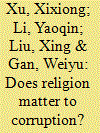| Srl | Item |
| 1 |
ID:
159020


|
|
|
|
|
| Summary/Abstract |
There is a growing interest in understanding how religion affects corruption. Using provincial-level panel data from 1998 to 2009, this paper investigates the effect of religious beliefs on bureaucratic corruption in China. The empirical results show that, bureaucratic corruption is negatively associated with local religious heritage, implying that religious culture plays a positive role in restraining official's corruption since religion has influence on political preference and work ethic. We also find that the negative association between religion and corruption is weaker in provinces with stronger law enforcement, which identifies the substitution effect between religious ethic and legal supervision in curbing corruption. Our findings also reveal that, among the different religions, the anti-corruption effects of China's native religions (i.e., Taoism and Buddhism) are more significant than those of foreign religions (i.e., Christianity and Islam). These conclusions are consistent and robust to various measures of main variables and a variety of robustness checks. Given the very few studies and limited data resources in the context of China, this paper as a tentative study provides new evidences of the relationship between religion and corruption.
|
|
|
|
|
|
|
|
|
|
|
|
|
|
|
|
| 2 |
ID:
133701


|
|
|
|
|
| Publication |
2014.
|
| Summary/Abstract |
Common notions about the source of communal land conflict in Africa have long explained it as growing out of conditions of environmental scarcity. This article argues instead that the institutional structure of the legal system is central to understanding which countries are prone to experience communal land conflict. When competing customary and modern jurisdictions coexist in countries inhabited by mixed identity groups, the conflicting sources of legal authority lead to insecurity about which source of law will prevail. Because the source of law is contested, conflict parties cannot trust the legal system to predictably adjudicate disputes, which encourages the use of extrajudicial vigilante measures. Using new data on communal violence in West Africa, this argument is examined for the period 1990-2009. The results show that in countries where competing jurisdictions exist, communal land conflict is 200-350% more likely. These findings suggest that researchers should consider the role of legal institutions and processes in relation to social unrest and collective violence
|
|
|
|
|
|
|
|
|
|
|
|
|
|
|
|